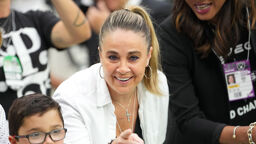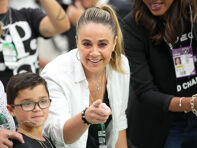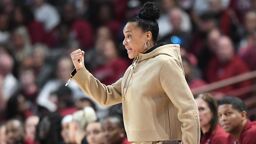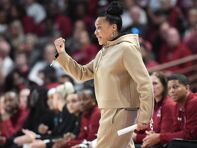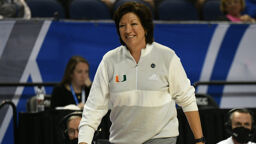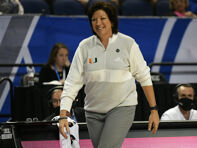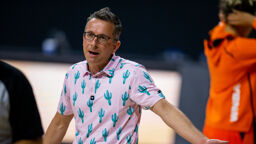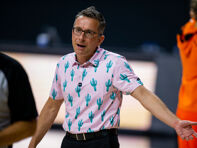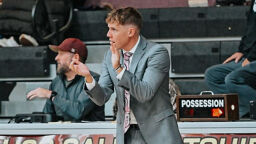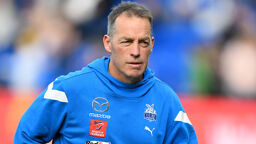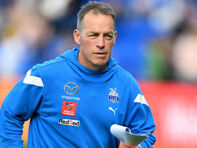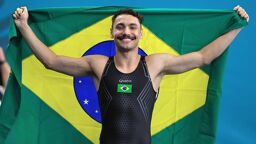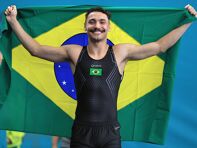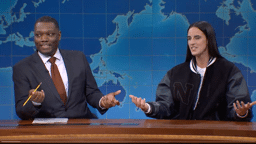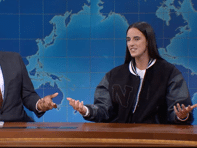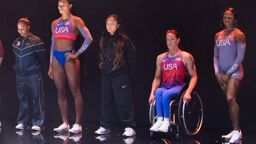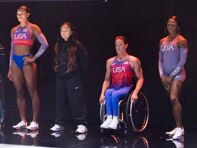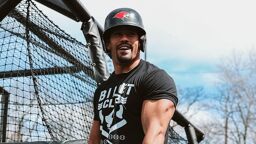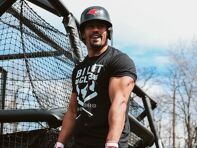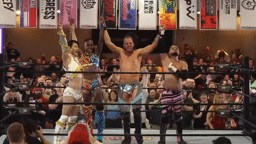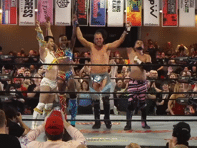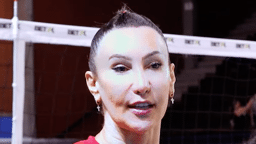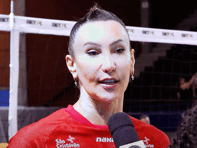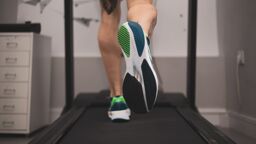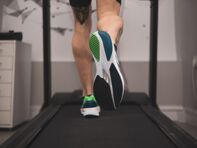Join Imran Malik and other coaches in a July 21 conversation about supporting athletes who come out on your team. Register here.
As the head rowing coach for Arizona State University, Imran Malik’s responsibilities fall far beyond individual practices and meets. He wants to be the mentor for his athletes that he lacked himself.
Malik became the head rowing coach for Arizona State’s men’s and women’s teams shortly after graduating in 2016, and the following year, he became varsity coach for Tempe Junior Crew. He fell in love with the sport during the 2012 London Olympics, staying up all night to watch the best teams in the world compete against each other. Malik’s identity as an Indian-American makes him an anomaly in the rowing world, and he’s withstood racial taunts throughout his time around the sport.
But during his time as a college student, his identity as a gay man is what gave him the most difficulty. When Malik was home from break as a freshman, his parents found pictures of him online with other gay people. After coming out, his parents kicked him out of their house, and almost prohibited him from returning to school. It was a dark period for Malik, who started engaging in self-harm, and even attempted suicide.
“I really just thought my life was over at that point,” he says. “Even when I started figuring out who I was at a young age, I really hated it, and tried to pray it away. Even after I came out, I tried so hard to suppress that back into myself. But I ended up kind of doing the complete opposite, and wound up just being more gay than ever. I fell into some really bad habits in terms of random hookups and sex and everything. Looking back now, I’m surprised I’m still healthy.”
Finally permitted to head back to school, Malik buried himself in rowing and his studies, and tensions with his parents slowly began to quell. His sexuality was no longer a point of hostility, but rather, something they ignored. A small breakthrough moment occurred when Malik introduced them to his boyfriend after an athletic event, but still, his parents made it clear they were uncomfortable with their son’s LGBTQ identity.
The awkward dance continued until this quarantine period, when Malik visited his parents, and spoke with his mother and aunt about being gay. For the first time, they’ve been able to enjoy free-flowing and open dialogue.
“I’m happy I have my mom and the rest of the people in my family and my close friends right now,” Malik says.

Malik takes these experiences with him everywhere, including the lake and boathouse. Even though he’s only three years older than some of his rowers at ASU, he still views them as his own, and wants to help them find comfort in their lives. He tries to build trust with each of his rowers, which has led nine athletes — seven male, two female — to come out to him. Malik will be part of a special Outsports Zoom conversation July 21 about how a coach can handle an athlete coming out as LGBTQ. (The event will be held in partnership with GO! Space and Equality Coaching Alliance.)
“The trauma that I’ve gone through growing up — hurting myself, coming out, bullying, everything — it has definitely shaped me into who I am today,” Malik says. “I don’t take things for granted anymore, and the way I coach, I think of these kids as my own kids — even if some of them are barely three years younger than me.”
Rowing is a mental game, and when you’re out there on the water, it can be easy to give up. When Malik is in the boat, he thinks about all of the times he could’ve given up in life, but decided to keep going.
If he can overcome getting kicked out of his parents house as an 18 year old — and subsequently seeing them move cross-country from Virginia to California without warning — then his rowers can persevere through a tough race.
“You want to push for that gold,” Malik says. “I take it into my own life. I’ve had times where I’ve wanted to give up in life, in general. And every time I’m rowing, I’ve thought about those times. It’s helped me push myself even further. Even as a coach where I’ve had issues, we’ve had failures, we’ve had issues on the team. How can we move forward from all of this?”

One of the biggest issues Malik has faced as a coach came when one of his assistants, who was also his age, started using gay slurs at practice and around LGBTQ team members. The coach would throw out misogynistic insults and chastise male rowers for “rowing like girls.” It created an uncomfortable environment, and even led to some out rowers on the team quitting. While the coach eventually left, Malik says he regrets not speaking up sooner. He’s still getting accustomed to his leadership role.
“I regret not calling it out sooner,” he says. “I think it was definitely a teachable moment for me. I just spent so much of my life being quiet and observing and not understanding how to react to a lot of situations. Working with him and all of that has helped me be more assertive in calling out that sort of stuff.”
Malik’s goal is to make the Arizona State rowing program as inclusive as possible, which he’s taken down to the high school level, too. In February, one of his high school athletes, who’s only 14, came out as transgender. Malik says it was heartwarming to see how quickly he was embraced by his teammates.
The world has changed a lot in recent years.
“I was completely inspired by it. The team was very accepting,” Malik says. “I don’t know what it is with kids in this generation, but they have been way more accepting than previous generations. They took his preferred name very well. I was just very happy with that. It was really cool to see a couple of the guys say, ‘Now you can row in our boat now.’ It was cool.”
Over the last four years, Malik has built the ASU rowing program into a powerhouse, qualifying for Nationals two years in a row. Before campus shutdown last spring, the team expanded to 50 members, its largest number ever.
But more importantly, Malik hopes everyone on his teams feel comfortable being themselves.
“It feels like I’m doing my job,” Malik says. “Yes, I am a rowing coach. I coach athletics, and all of the stuff that has to do with that. But when I’m coaching, I put more of my focus on the wellbeing of all of my kids, and making sure they have a safe space, and are able to be who they are now — no matter what they’re going through. To have kids as young as 14 to be able to feel comfortable enough to be themselves in a sport is really cool for me to see.
“I didn’t have a gay leader to look up to. If I can be that for these kids, then that’s perfect.”
Sign up for our Zoom conversation on July 21 at 8 p.m. ET here. Registration is free.



